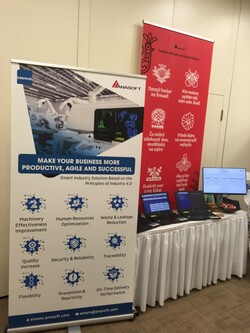Sustainability as a Reigning Topic in the Logistics Segment
2018-05-29
 Central European logistics congress, EASTLOG, entered the third decade of its existence recently. The company, ANASOFT aided it by partnering with its new section, ITLOG.
Central European logistics congress, EASTLOG, entered the third decade of its existence recently. The company, ANASOFT aided it by partnering with its new section, ITLOG.
The 21st edition of the Central European congress EASTLOG—the largest logistics gathering in the Czech Republic where visitors can learn about latest trends in the logistics sector thanks to the rich program. The program is divided into six sections, covering the following fields: transport and spedition, e-commerce, human resources, intralogistics, warehouse management, and industrial development.
The main topic of EASTLOG 2018 was sustainability in different forms that was reflected throughout all the sections. Hockey trainer, mental coach, and motivator, Marian Jelínek opened the congress with his speech, broaching the subject of the feasibility of sustained happiness while living in abundance.
His talk was based on the observation that despite an increase in abundance living, the general feeling of happiness, contentment is in an obvious decline. Economist Vladimír Pikora expounded on the topic of sustainability, arguing that it is a trend that is most notable in the context of enterprises. While taking current tempo of changes into account, he stated that logistics companies have to be inclined toward changes to be able to subsist.
The sustainability of companies again stuck out as the hot topic in this year’s logistics congress. Representatives of logistics companies along personal agency reflected on the topic during a panel discussion. Subsequently, Filip Plevač introduced current possibilities and procedure serviceable in digitalizing logistics processes.
ANASOFT—a partner of the new programming section, ITLOG— broadened on the topic in its case study about smart logistics. Peter Bílik, Smart Industry Solution designer, demonstrated the sustainability of a company using a practical example of a digitally transformed enterprise.
The digital transformation of enterprises is gradually changing from a tactic used to achieve competitive advantage to an industry norm; from a tool to expand an enterprise’s activities to an instrument to sustain current enterprise activities. Thanks to new technologies, such as digital twin and interoperable network of equipment, Smart Industry solution EMANS, which is designed based on the principles of Industry 4.0 and cyber-physical production systems, helped a company innovate logistics and enterprise processes in a way that not only enhances production potential and capacity but also minimizes the error-rate while ensuring flexibility for prompt reactiveness to market changes.
Interconnectivity of industrial internet of things and digitalization of enterprise processes enables mutual communication in the spheres of human, material, and equipment resources. These devices lead to effective planning and optimization of logistics operations, managed by autonomous algorithms. Furthermore, the digitalization facilitates the dematerialization of enterprises processes, converting the company into a paperless venture, thus becoming environmentally sustainable and manages to diminish operational costs.







